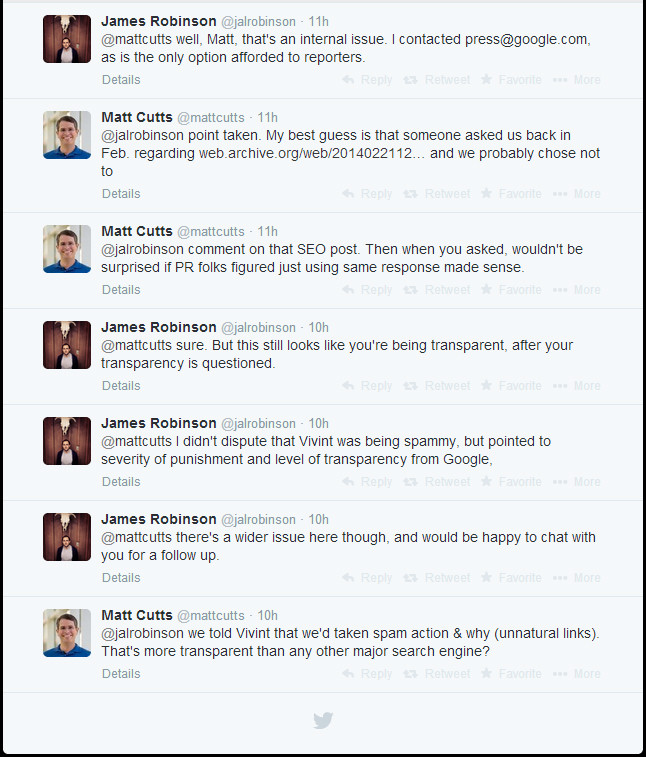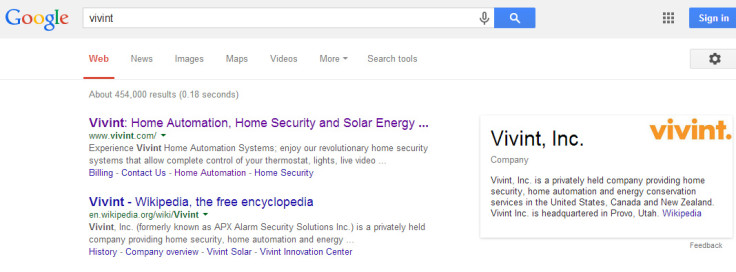Did Google Deliberately Remove Vivint From Search Results For Being a Nest Competitor?

Been missing your dose of Silicon Valley gossip? Here's the latest drama – Vivint vs Google.
Yesterday, Utah-based home automation company Vivint, which is a competitor of Nest's smart thermostats, accused Google of deliberately removing it from search results for four months without telling it why.
Vivint's founder and CEO Todd Pedersen and VP of Innovation Jeremy Warren told Pando Daily that 16 days after Google acquired Nest, Vivint stopped appearing in Google search results completely.
It wasn't bumped down the results either – according to search specialists Foxtail Marketing, out of 3,300 possible search terms that would have shown Vivint in Google's search results, the company was only listed for three, meaning that it had all but disappeared from the web.
Lack of transparency
Vivint, which was acquired by investment group Blackstone in 2012, says it was told by Google that certain external links to Vivint's website fell outside of the search engine's "quality guidelines", but not what they were.
"Our recent experience with Google search results was difficult due to a lack of transparency," Warren said.
"We were provided with vague descriptions of Google's preferences and requirements, which leaves lots of room for interpretation."
Pedersen and Warren said that Vivint had to figure out what it had done wrong by itself, and then repeatedly petition Google to be reinstated.
Two different sides to the story
IBTimes UK contacted Google about Vivint's complaint, but the search giant gave the exact same response that it gave to Pando.
A Google spokesperson said: "We typically don't go into details on specific sites, but we're always working to improve the quality of search results for our users.
"We work hard to encourage an ecosystem of successful publishers and high-quality content."
Yet, several hours after Pando posted its story, Google's head of webspam Matt Cutts popped up on YCominator's Hacker News social bookmarking website with a retort.
"It's a shame that Pando's inquiry didn't make it to me, because the suggestion that Google took action on vivint.com because it was somehow related to Nest is silly," he wrote on the link to Pando's piece.
"As part of a crackdown on a spammy blog posting network [in November 2013], we took action on vivint.com – along with hundreds of other sites at the same time that were attempting to spam search results."
Twitter row
In his post, Cutts posted five URLS, saying that Google had taken action against Vivint because it was "spamming with low-quality or spam articles". In particular, Cutts claimed that over 25,000 links were coming to Vivint from a website with a paid relationship to it, and that these links should have been "nofollowed".
Cutts also took it a step further, contacting the Pando article's author James Robinson over Twitter and arguing with him about Google's levels of transparency:
@jalrobinson somehow your inquiry about http://t.co/Ci5H3URr9T didn't make it to me. I responded here: https://t.co/HOHSLDubxf
— Matt Cutts (@mattcutts) May 30, 2014
So what really happened?
If Vivint was breaking Google's search engine rules, that's one thing, but usually websites that offend the search giant don't tend to disappear for four whole months – for example, music lyrics website Rap Genius was back on the search engine within two weeks.
On the other hand, Google has been questioned before over suggestions of favouring its own services over those of its competitors' in search result lists.
In April, Google settled a two-year antitrust investigation with the European Commission, which was brought by 125 rivals including Microsoft, Yelp and TripAdvisor.

In order to avoid a £3 billion ($5 bn) fine, Google now has to give more prominence to competing websites and services in European search results for the next five years, and websites are now allowed to block 10% of their content so that the search engine cannot add the content to its own search results.
Responding to arguments from Hacker News posters over the Vivint issue, Cutts said that it is not that hard to find out what the spamming posts were.
He also said that Google's algorithmic and manual protections against link spamming are on such a huge scale that the time it took for the site to be reinstated is not unusual.
Perhaps the best advice is just to make sure that your company's website is completely compliant with Google's webmaster guidelines.
© Copyright IBTimes 2025. All rights reserved.






















